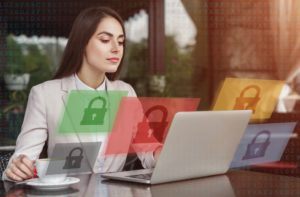While on a skiing trip in France, I got a call on my business line.
“I need urgent help and wonder if you could help me” – sure, madam. But can you tell me more?
The lady on the other side of the line was cautious, trying to give me as little details as possible. “Someone might be trying to hack me, and I need help.”
Little by little, she spared more and more details. She has three daughters and has never worked on protecting her or their digital life. Her ex-partner turned out to have IT and cybersecurity knowledge and might have the means and motive to cause them harm through hacking.
I knew what she was talking about well – as I have been helping people like her for many years.
We scheduled our first work session and started going through all her accounts and devices, securing them meticulously, one by one.
She was surprised at how many angles we needed to protect beyond changing passwords. You see, every service you use allows for recovery options. Every one of those recovery options could be used to get in, and every recovery option by itself could have other recovery options… and so on.
The cybersecurity chain is only as strong as its weakest link.
Affluent individuals often lack the technical experience or knowledge and rely on sheer luck or some unlucky antivirus program to protect them, often resulting in security breaches. Their children also need protection, and other family members who have access to resources or have something to lose online.
Affluent individuals are much sweeter targets for hackers than regular people and, as a result, become targets more often.
Not just your bank account or email address might be targeted. Your movements could be tracked by accessing your favorite jet, hotel, or luxury car booking service. All kinds of embarrassing details could affect your reputation by accessing your iCloud photos, texts, dating profiles, etc. And it is not easy trusting someone to help you secure these sensitive profiles and services…
Understanding Your Digital Footprint
Your digital footprint as an affluent individual involves understanding your unique online behaviors, interactions, and the trail of data you leave across the internet and your devices. Wealthy individuals often have a more complex and extensive digital footprint due to their high level of engagement with digital services, including financial transactions, social media, luxury goods purchases, and exclusive services. Here’s a detailed breakdown of what constitutes your digital footprint:
Financial Transactions and Wealth Management
- Online Banking and Investments: Individuals with high net worth frequently use online platforms for banking, investing, and managing their wealth. This includes transactions, portfolio management, and communication with financial advisors.
- Real Estate Transactions: Digital records of property searches, purchases, sales, and ownership, often involving high-value assets.
Social Media and Online Presence
- Exclusive Social Networks: Membership in private or exclusive social networks catering to affluent individuals.
- Public Social Media Profiles: Engagement on popular platforms, which might include sharing insights into personal lifestyles, travels, and philanthropic activities.
- Professional Networking Sites: Profiles and interactions on platforms like LinkedIn, showcasing professional achievements, endorsements, and networks.
Travel and Lifestyle
- Travel Bookings: Records of flights, luxury accommodations, and exclusive experiences booked online.
- Location Data: Geotagged photos and check-ins at upscale venues, private clubs, and luxury destinations. You might not realize this, but photos you take with your phone or even your camera might contain geolocation and other details you might not be willing to share with the whole Internet.
- Lifestyle Purchases: Online purchases of luxury goods, services, and memberships to exclusive clubs and societies. The sites might keep the purchase details secret, but it would often be trivial to hackers if someone were to gain access to your profile on that online shopping site.
Communication and Data Sharing
- Email and Messaging: Use premium or secure email services and encrypted messaging apps for personal and business communication.
- Cloud Storage: Use private or premium cloud services to store sensitive personal and business data.
Security and Privacy Measures
- Cybersecurity Services: Subscription to advanced cybersecurity protection and privacy services.
- Online Privacy Tools: Use of VPNs, encrypted communication tools, and services to manage or erase digital footprints. You’d be surprised how many wealthy people use VPNs to protect themselves without realizing the risks of using weak passwords for the VPN service (their website).
Philanthropy and Investments
- Digital Philanthropy: Participation in online fundraising, charitable donations, and support for causes through digital platforms.
- Angel Investing and Crowdfunding: Digital footprints left through investments in startups, crowdfunding platforms, and venture philanthropy.
Education and Exclusive Content
- Subscription Services: Subscriptions to premium content, exclusive reports, and educational platforms.
- Digital Learning: Participation in online courses, webinars, and exclusive talks catering to high-net-worth audiences.
Legal and Professional Services
- Online Consultations: Engagements with legal, financial, and consulting services through digital platforms.
- Digital Contracts and Signatures: Use of digital platforms for signing and managing contracts and legal documents.
Your digital footprint might differ from your children’s, but you are still connected, and if someone were to hack your child’s iPhone or iCloud account, they could very well see your location and other personal details. Protect your children just as well as you protect yourself.
Risks associated with an extensive digital footprint:
- You could become an easy target to extortionists, online activists, rivals, ex-es, etc.
- Your wealth management strategies might become known to parties you might not be willing to disclose them to.
- Your reputation might be at stake if people discover sensitive personal details (even though everyone has them).
- Your online banking and wealth management services might allow transfers to criminals if someone were to obtain access similar to yours.
Basic Cybersecurity Measures
Learn to walk before you can run. We can and will help you establish military-grade security around your digital life, but you cannot build a fortress if you don’t follow the basics.
- Strong password policies and management tools: at the very minimum, use a password manager. You could have yours offline or online, but please have one. Also, don’t set your online password manager’s password to ‘P@ssw0rd123’!
- Two-factor authentication (2FA) is necessary, but please avoid using your cell phone as your 2FA method. Cell phone sim cards are notoriously easy to duplicate, all one has to do is walk into your provider’s shop with a fake ID and tell them, ‘I lost my sim card, please give me a new one’ – easier than taking candy from a child, takes 5 minutes at almost zero risk to the perpetrator.
- Regular software updates and security patches: how often do you update your phone, computer, or other devices? We’ve heard of security breaches through a fish tank…
- Secure Wi-Fi usage practices, including VPNs: your home network has to be secure. Your home might be a known address, or it might be in a targeted neighborhood; regardless, your Wi-Fi must be secure, and the VPN services you use must be safe, too.
Advanced Security Strategies
- Encryption of sensitive data and communications: learn how to use secure messaging services and when. Learn how to encrypt individual files or whole data drives and exchange them with others.
- Use of secure and private email services: but use them wisely. Your most critical accounts must be created with private, secret, secure email accounts. Such a critical account is your iCloud or Google account if you use an Android device.
- Respect the role of secure cloud storage solutions.
- Understand and manage the privacy settings on social media. One famous calling/messaging app allows you to turn OFF the default ON setting of selling your data to hundreds of 3rd party companies…
Safeguard Your Financial Transactions
- Take security measures for online banking and financial services. Such security measures might include creating virtual cards for various expenses so that when an online shopping site gets hacked, all the hackers can use is a virtual card with small amounts of cash.
- Be aware of phishing scams and how to avoid them: in other words, hackers will try to mimic your bank, DHL or other services, trying to get you to submit your login details. Always verify where you’re sending your username and password, check the domain, URL, etc.
Protect Your Travel History and Movements
- Understand the risks associated with sharing your travel plans online.
- Use geolocation services wisely. Some fitness apps reveal way too much publicly without your awareness. Do you want the whole world to know where you ride your bike every morning or night? What about your children?
- Understand the importance of VPNs while accessing the internet abroad.
- Secure booking: Ensure the travel websites and apps you use are safe. If they are not secure, they can be made secure using good security practices, such as using aliases, fake names, alias email addresses, alias phone numbers (virtual phone numbers), etc.
On the Road: Cybersecurity While Traveling
- Public Wi-Fi: There are risks and safe usage practices; use a secure VPN service as a baseline every time you use a publicly accessible Wi-Fi network.
- Physical device security in public places: your devices can be snatched and most likely will be lost and or/broken at some point. Back them up, encrypt them, have secure pin/codes for them.
- Secure communication: Use encrypted messaging and calling apps.
Manage Your Online Reputation
Years ago, I worked as a cyber crime investigator in Dubai. During our investigations, we often used the perpetrators’ social media presence to discover more about them, their location, habits and drill down from there. For example, if the suspect uploaded a photo, we investigated the photo metadata, trying to find details about the camera used, geolocation in the photo, details about the physical location or details in the photos, etc. Criminals use similar processes to profile their targets before they ‘hit’. It might not be worth it to share your whole life online.
- Monitor your digital footprint.
- See the impact of social media on your security and try and delete anything and everything that is not necessary. Your weekly tradition of yours going somewhere for breakfast? Are you sure you want everyone to know that you are away from home weekly at a specific hour?
- Use strategies to manage and clean up your online presence, even if something might seem ‘old’ and not relevant anymore. Trust me, everything is relevant; the more you publish online, the better.
Cybersecurity for Family and Close Associates
- Educate your family members on cybersecurity basics. If your child is over 12, they should already know what 2-factor authentication is and how hackers might send them fake login links.
- Implement cybersecurity measures for household staff. Teach your family members how to create unique passwords for key services, even better: get them their own password manager and make sure they are comfortable using one.
- Coordinate cybersecurity efforts with close associates. It’s not just your family that you should take care of. If your employees hold responsibility over significant portions of your wealth, give them the tools to keep themselves and your assets safe.
Responding to Security Breaches
- Steps to take if your personal information is compromised.
- When and how to seek professional cybersecurity assistance.
- Legal considerations and actions in the event of identity theft.
Recap
The key cybersecurity measures for affluent individuals include privacy, good password management, unique, secret email accounts and virtual phone numbers to be used for key, secret accounts such as your iCloud account.
Cybersecurity vigilance should become a habit for you and your close family members and associates. The more resources you have, the more there is to lose if you act carelessly or hope that if something hasn’t happened yet, it will not happen.
Reach out if you need help (actually, reach out *before* you need help)
At Atlant Security, we take utmost care to protect your privacy and digital footprint. We protect affluent individuals’ digital (and real) lives as one of our primary and most widely used services. We could either offer you a personalized cybersecurity assessment or move to swiftly protect your whole digital life in a matter of days.
Besides your personal life, we can also take care of your businesses and employees, ensuring everyone follows the same strict rules on privacy and cybersecurity and is protected as well as you are.



